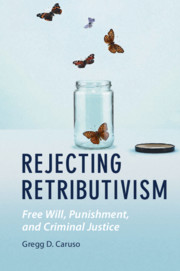Book contents
- Rejecting Retributivism
- Law and the Cognitive Sciences
- Rejecting Retributivism
- Copyright page
- Dedication
- Contents
- Acknowledgments
- 1 Free Will, Legal Punishment, and Retributivism
- 2 Free Will Skepticism
- 3 The Epistemic Argument against Retributivism
- 4 Additional Reasons for Rejecting Retributivism
- 5 Consequentialist, Educational, and Mixed Theories of Punishment
- 6 The Public Health–Quarantine Model I
- 7 The Public Health–Quarantine Model II
- 8 The Public Health–Quarantine Model III
- 9 The Public Health–Quarantine Model IV
- References
- Index
2 - Free Will Skepticism
Hard Incompatibilism and Hard Luck
Published online by Cambridge University Press: 06 May 2021
- Rejecting Retributivism
- Law and the Cognitive Sciences
- Rejecting Retributivism
- Copyright page
- Dedication
- Contents
- Acknowledgments
- 1 Free Will, Legal Punishment, and Retributivism
- 2 Free Will Skepticism
- 3 The Epistemic Argument against Retributivism
- 4 Additional Reasons for Rejecting Retributivism
- 5 Consequentialist, Educational, and Mixed Theories of Punishment
- 6 The Public Health–Quarantine Model I
- 7 The Public Health–Quarantine Model II
- 8 The Public Health–Quarantine Model III
- 9 The Public Health–Quarantine Model IV
- References
- Index
Summary
The first, which is the focus of this chapter, argues that free will skepticism is the only reasonable position to adopt when it comes to the problem of free will. And since retributive punishment requires the kind of free will associated with basic desert moral responsibility in order to be justified, free will skepticism implies that retributive punishment lacks justification. Hence, in so far as we demand justified legal punishment practices, we should reject retributivism in light of the philosophical arguments against free will and basic desert moral responsibility. We can call this argument the skeptical argument against retributivism since it maintains that free will skepticism undermines the retributivist notion that wrongdoers deserve to be punished in the backward-looking sense required.
- Type
- Chapter
- Information
- Rejecting RetributivismFree Will, Punishment, and Criminal Justice, pp. 35 - 108Publisher: Cambridge University PressPrint publication year: 2021

